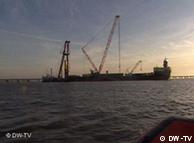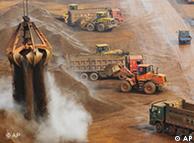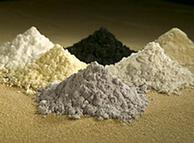Germany is at the heart of Europe high-tech manufacturing base, German companies know about the value for the Rare Earths secure supply not from the mass media, but from the day-to-day operation. Siemens has recently announced its search for the secure Rare Earths supply as part of its growth strategy. We are finding the conclusions in this article to be very close to our own understanding of this story so far.
The most important message in all this development in the Rare Earths sector could be not even this discovery and its economic viability, but the mass media perception and hype of this story - Rare Earths and their strategic values are coming out into the mass market space.
The most important message in all this development in the Rare Earths sector could be not even this discovery and its economic viability, but the mass media perception and hype of this story - Rare Earths and their strategic values are coming out into the mass market space.
James Dines with Jim Puplava: The Last Opportunity To Load The Truck With Rare Earths At This Levels
"Rare Earths: Why Japan's Mitsubishi UFJ Financial Group buys not the map of the Pacific Ocean Floor with REE dirt, but $324m stake in Lynas Corp.? While all social media was getting crazy today about Rare Earths found by Japan on the floor of the Pacific Ocean, Japanese companies themselves are making the real business in order to secure the real Rare Earths supply. We were really surprised today by the magnitude of the interest or even manipulation of the social media with the news about Rare Earths findings on the Pacific Ocean Floor.
Some articles have even suggested that "the REE could be easily extracted using acids on the ships excavating the ore" (or dirt with these kind of grades) from the Ocean Floor miles below the surface. Acid, Ocean Floor, Radioactive waste, 20 years time development - should we even continue? Every economic deposit is the function of grades, commodity price and technical ability to extract the valuable material in environmentally acceptable way. Do not sell your solid REE plays yet and maybe even use this opportunity to buy more."
DW-World.de:
RAW MATERIALS | 05.07.2011
German industry is skeptical about major rare-earths find
A research team from the University of Tokyo has discovered 100 billion tons of underwater deposits of rare-earth elements in the Pacific, which could be crucial to the world's high tech industry. The report was published in the online edition of Nature Geoscience magazine.
The scientists, led by Professor Yasuhiro Kato, say they found the high-concentration deposits in sea mud near Hawaii and in a zone around Tahiti, at 78 different sites.
"We estimate that an area of just one square kilometer surrounding one of the sampling sites could provide one-fifth of the current annual world consumption of these elements," Kato said.
Rare earth elements, or rare earths, as they are commonly known, are widely used in the automotive, electronics and power production industries. Certain rare earths are also used in the production of missiles.
Deep underground
 Off-shore mining is a costly and dangerous businessThe deposits are between 3,500 to 6,000 meters below sea level. Although the scientists say that extraction will be easy due to the high concentration of minerals, most experts agree that it will be a number of years before mining can begin.
Off-shore mining is a costly and dangerous businessThe deposits are between 3,500 to 6,000 meters below sea level. Although the scientists say that extraction will be easy due to the high concentration of minerals, most experts agree that it will be a number of years before mining can begin."A mine like this takes five to seven years to start up, said Professor Franz Meyer, mineralogist from the University of Aachen. "Underwater mining can take even longer to get going."
There has been no indication from the researchers as to when mining could begin, and it is unclear who will have ownership of the reserves.
Kato said the samples were especially rich in the more valuable heavy rare earths such as gadolinium, lutetium, terbium and dysprosium.
China still dominates
 Most rare-earth mining occurs on land in ChinaThe find comes as tensions between Japan and China over the supply of rare earths persist. During territorial disputes between the two countries last year, China temporarily blocked rare earths shipments to Japan.
Most rare-earth mining occurs on land in ChinaThe find comes as tensions between Japan and China over the supply of rare earths persist. During territorial disputes between the two countries last year, China temporarily blocked rare earths shipments to Japan.China currently provides more than 90 percent of the world's rare earth elements. German-based analysts say that is not about to change.
"The importance of this find shouldn't be over-estimated. Rare earth elements have never been obtained from these sorts of depths before. Entirely new technologies will need to be developed for the extraction," said Daniel Briesemann, natural resources expert at Commerzbank, in interview with Deutsche Welle.
Reuben Davies, a commodities trader in Berlin with CML Markets, agrees. "The fact that these types of mining operations take years to become commercially viable will mean this news is only likely to have a temporary effect on current prices."
High prices an issue
 Automakers are just one of many industries affected by the newsGerman industry would appreciate any diversification they can get in the rare-earths supply chain. A wide range of industries have been affected by recent price hikes in rare earth prices from China.
Automakers are just one of many industries affected by the newsGerman industry would appreciate any diversification they can get in the rare-earths supply chain. A wide range of industries have been affected by recent price hikes in rare earth prices from China.The electronics industry has been hit especially hard, as rare earths are used in a range of electronic items, from televisions, to LEDs, to mobile phones. "At the moment we have a very difficult situation," said Andreas Gontermann, chief economist at Germany's Electrical and Electronics Industry Organization (ZVEI). "We hope that through re-opening rare earth mines in Australia and Canada, things will become easier by mid-2012."
"For the future it could be interesting, but I don't expect it will make any difference in the short to mid-term," said Carsten Rolle, Energy and Commodities Chief at the Federation of German Industry (BDI).
Author: André Leslie
Editor: Nicole Goebel "
Editor: Nicole Goebel "



No comments:
Post a Comment